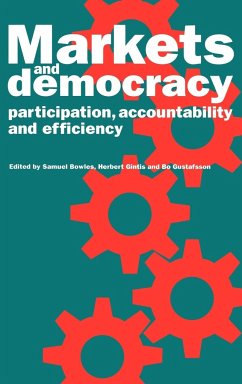The market does not spontaneously generate democrate or participatory economic institutions. This book asks whether a modern, efficient economy can be rendered democratically accountable and, if so, what strategic changes might be required to regulate the market-mediated interaction of economic agents. The contributors bring contemporary microeconomic theory to bear on a range of related issues, including the relationship between democratic firms and efficiency in market economies; incentives and the relative merits of various forms of internal democratic decision-making; and the effects of democratically accountable firms on innovation, saving, investment, and on the informational and disciplinary aspects of markets. Various approaches to the study of economic interaction (game theory, transactions' cost analysis, social choice theory, rent-seeking, etc.) are considered in an attempt to understand the relationship between power and efficiency in market economies.
Table of contents:
List of figures; List of tables; Preface Bo Gustafsson; 1. Post-Walrasian political economy Samuel Bowles and Herbert Gintis; Part I. Agency, Incentives, and Democratic Accountability: 2. The democratic firm: an agency-theoretic evaluation Samuel Bowles and Herbert Gintis; 3. Alternative employment and payment systems D. M. Nuti; Part II. Institutions and Institutional Change: 4. Toward a framework for analyzing institutions and institutional change Leonid Hurwicz; 5. Imperfect choice and rule-governed behaviour Ronald A. Heiner; 6. Organizational equilibria and institutional stability Ugo Pagano; 7. Agency problems and the future of comparative systems' theory Mieke Meurs; Part III. Conditions For the Success of the Democratic Firm: 8. After the employment relation: problems on the road to enterprise democracy Louis Putterman; 9. Unions versus cooperatives Karl Ove Moene and Michael Wallerstein; 10. Demand variability and work organization David I. Levine; 11. Democracy versus appropriability: can labor-managed firms flourish in a capitalist world? Gregory K. Dow; Part IV. Productivity, Distribution, and Power: 12. Cooperation, conflict, and control in organizations Avner Ben-Ner; 13. Wage bargaining and the choice of production technique in capitalist firms Gilbert L. Skillmand and Harl E. Ryder; Part V. Ownership, Participation, and Capital Markets: 14. The motivational role of an external agent in the informationally-participatory firm Masahiko Aoki; 15. Unstable ownership Tone Ogedal; 16. The simple analytics of a membership market in a labor-managed economy Ernst Fehr; Part VI. Political Democracy and Economic Democracy: 17. Investment planning in market socialism Ignacio Ortuno-Ortin, John E. Roemer and Joaquim Silvestre; 18. Capitalism and Democracy: a summing up of the arguments Martin L. Weitzman; Bibliography; Author Index; Subject index.
The market does not spontaneously generate democratic or participatory economic institutions. The contributors to this book use contemporary microeconomic theory to study whether a modern, efficient economy can be rendered democratically accountable and, if so, what strategic changes might be required to regulate the market-mediated interaction of economic agents.
This book asks whether a modern, efficient economy can be rendered democratically accountable and, if so, what strategic changes might be required to regulate the market-mediated interaction of economic agents.
Hinweis: Dieser Artikel kann nur an eine deutsche Lieferadresse ausgeliefert werden.
Table of contents:
List of figures; List of tables; Preface Bo Gustafsson; 1. Post-Walrasian political economy Samuel Bowles and Herbert Gintis; Part I. Agency, Incentives, and Democratic Accountability: 2. The democratic firm: an agency-theoretic evaluation Samuel Bowles and Herbert Gintis; 3. Alternative employment and payment systems D. M. Nuti; Part II. Institutions and Institutional Change: 4. Toward a framework for analyzing institutions and institutional change Leonid Hurwicz; 5. Imperfect choice and rule-governed behaviour Ronald A. Heiner; 6. Organizational equilibria and institutional stability Ugo Pagano; 7. Agency problems and the future of comparative systems' theory Mieke Meurs; Part III. Conditions For the Success of the Democratic Firm: 8. After the employment relation: problems on the road to enterprise democracy Louis Putterman; 9. Unions versus cooperatives Karl Ove Moene and Michael Wallerstein; 10. Demand variability and work organization David I. Levine; 11. Democracy versus appropriability: can labor-managed firms flourish in a capitalist world? Gregory K. Dow; Part IV. Productivity, Distribution, and Power: 12. Cooperation, conflict, and control in organizations Avner Ben-Ner; 13. Wage bargaining and the choice of production technique in capitalist firms Gilbert L. Skillmand and Harl E. Ryder; Part V. Ownership, Participation, and Capital Markets: 14. The motivational role of an external agent in the informationally-participatory firm Masahiko Aoki; 15. Unstable ownership Tone Ogedal; 16. The simple analytics of a membership market in a labor-managed economy Ernst Fehr; Part VI. Political Democracy and Economic Democracy: 17. Investment planning in market socialism Ignacio Ortuno-Ortin, John E. Roemer and Joaquim Silvestre; 18. Capitalism and Democracy: a summing up of the arguments Martin L. Weitzman; Bibliography; Author Index; Subject index.
The market does not spontaneously generate democratic or participatory economic institutions. The contributors to this book use contemporary microeconomic theory to study whether a modern, efficient economy can be rendered democratically accountable and, if so, what strategic changes might be required to regulate the market-mediated interaction of economic agents.
This book asks whether a modern, efficient economy can be rendered democratically accountable and, if so, what strategic changes might be required to regulate the market-mediated interaction of economic agents.
Hinweis: Dieser Artikel kann nur an eine deutsche Lieferadresse ausgeliefert werden.








